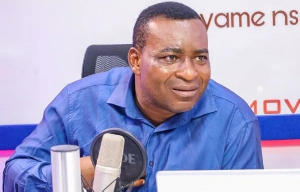Oral Village Ideas
By
Daniel Appiah-Adjei
Re-Interpreting History Through Drama: How Dwenti Captured Owuo Apakan In The Making Of A Play Entitled “Death On Trial”
Historical education finds itself at a crossroads from time immemorial to the present age. One road leads to greater accountability through more testing where people subject history to scientific analysis. The other road suggests that learners learn best in interactive environment, which give students various opportunities to experience the way history has been made. One of such ways is through Drama. Observing living dramatists at work and recording life histories, the writer shows art and creativity, and indeed tradition, to be dynamic processes requiring reexamination of previously held assumptions.
This week’s article is aimed at discussing the history of Bodomase, a village near Kumawu in the Ashanti region, where a great warrior by name Dwenti, fought Death and captured his (Death’s) mortal box, (Owuo Apakan)and small Drum. The discussion will take into consideration of how this Historical happening has been reworked or re-interpreted through creative processes into a play entitled “Death on trial” by Daniel Appiah-Adjei, the columnist.
Defining History
I am not a practicing historian so it will be very difficult to accurately define history but the little history I learned from school has provided me with this definition and that;
History could mean the bodies of knowledge about the past produced by historians, together with everything that is involved in the production, communication of, and teaching about that knowledge.
This is in recognition of the simple fact that knowledge of the past is essential to society. What happens in the present, and what will happen in the future, is very much governed by what happened in the past. It is obvious that knowledge of the past has not brought easy solutions to problems. But without a thorough knowledge of past events and circumstances, we could not even attempt to grapple with these problems. Without knowledge of the past we would be without identity, we would be lost on an endless sea of time.
The simplest answer to the questions of the ignorant “Why do history?" or "What is the use of history?" is: "Try to imagine what it would be like to live in a society where there was absolutely no knowledge of the past." The mind boggles. Of course, if history has this vital importance for society, then it must be as accurate as possible; it must be based on evidence and logical thought, not on specious theory or political ideology. The playwright should tap on it and use it.
History also provides training in the writing up of the results of one's researches, in the form of essays, reports, dissertations. What is essential in history is clear and effective communication, well structured, and written in precise and explicit language. This is what the dramatist aspires to achieve.
History and Human values
Many who call themselves "dramatists" do, indeed, use "history" as a vehicle for expressing their own political commitment. That is sheer self-indulgence. History is a scholarly, not a political, activity, and while, as citizens, we certainly should act upon our political views, in writing plays we have an absolute obligation to try to exclude them. Most dramatists, like, most historians and scientists, are motivated by the urge to find out. Historians do disagree with each other in their interpretations, as do scientists. But history deals with human values, in a way the sciences do not, so there is more scope for differences in evaluation.
The History of Bodomase
About 700 years ago, a man called Ohenemano, a merchant trader dealing in goods of European manufacture, traded from the coast to the Northern Territories, bringing back captives whom he sold as slaves to Danes and Dutch. He hailed from Asuom in the Akim Abuakwa State. Ohenemano was the heir to the stool of Asuom and hence part of the royal family.
At that time, the trade route from the coast to the Northern territories passed through Kumawu, a town about Thirty Kilometres from Kumasi, the capital of the Asante kingdom.. It happened one day as he made a stop-over at Kumawu, Ohenemano saw a maiden from the royal house of Kumawu and fell in love with her. He later got married to her, and after some time she became a mother giving birth to a male who was named Dwenti Asimpa. The mother of Dwenti unfortunately died just after delivery.
During that time, the chief of Kumawu was the commander of the Asantehene’s army and he had good relations with the chief of Techiman, another town, about Forty Kilometres from Kumawu. A woman from the Techiman Royal house called Gyinantiwaa came to stay with the chief of Kumawu (Kumawuhene) and she was given the responsibility to take care of the little Dwenti Asimpa.
Dwenti grew to become a veteran hunter; very strong, tall and hairy. In one of his hunting expeditions, he met a strange man called Oporofo Koti who lived under a big tree called Bodom in a forest near Kumawu. They became good friends and Oporofo Koti trained and built Dwenti Asimpa spiritually.
The Bodom tree under which Oporofo Koti lived
Because of Dwenti’s strength and courage he fought well at any position he was assigned anytime, the people of Kumawu went to war. This made him very popular among the people of Kumawu.
The riddle
When the Chief of Kumawu died, the choice of a successor fell upon Dwenti because of his immense popularity. At the installation and the swearing in ceremony, things took a different turn. A man called Okyere Baffour, a brother to Dwenti stopped the ceremony to put a riddle to the Kumawu Elders.
He asked them, “A fowl of the house, and a partridge from the field, which is more fit to wear a golden chain?” After a little deliberation, the Elders decided in favor of the fowl of the house. Because the partridge has come from the bush would eventually return to the bush. He therefore, revealed to them, the true family relationship between Dwenti and the royal house of Kumawu and reminded his hearers that there was blood feud between Ashantis and Akims. As a reminder, Dwenti’s father Nana Ohenemano was from the royal house of the Akim Asuom.
Upon listening to his information, the people of Kumawu declared that, if a man whose father is from the Royal House of Akim is made to occupy the Ashanti stool of Kumawu, seeing that his father an Akim, it would be very difficult to lead the Ashantis to war against the Akims and he may betray the Asantes.
Dwenti, was therefore prevented from swearing the oath of allegiance and Okyere Baffour who was also from the Royal house of Kumawu was enstooled as the new Chief of Kumawu.
Not being able to become a chief, he packed his belonging and left Kumawu to no other particular place but Bodomase. His father also left Asuom and was heading south when he met his son with a group of people. They then settled under a big tree in a forest near Kumawu where Dwenti’s spiritual mentor and friend Oporofo Koti was staying.
Oporofo Koti accepted them and they settle there in peace. Dwenti went with three groups of people (clans) on his way to Oporofo Koti’s place. They were the Aduanas, Oyokos and Bretuo. His father also came with some groups as well.
As they grew in number, the people decided to make Dwenti their Chief. They also thought of a name for their new settlement.Because they settled under the big tree called Bodom, They named the town Bodomase.(Under the Bodom tree).
Dwenti Asimpa accepted to become the chief of Bodomase and swore an oath of allegiance to the chief of Kumawu as Bodomase was under the jurisdiction of the Chief of Kumawu. Nana
Dwenti Asimpa became the first chief of Bodomase.
Dwenti Fought Death
Nana Dwenti Asimpa, the founder and chief of Bodomase one day, went to Kumawu to celebrate the Adae Festival. This festival is celebrated every forty-days on the Akan calendar.
In those days as there were no roads, he had to go and return through the forest.
Bodomase Village and the mountain on which Dwenti fought death
On his way back, darkness suddenly appeared right in front of him. Being a spiritually developed man, he sensed that there was something wrong. Nana Dwenti Asimpa positioned his flint gun and challenged whoever was there to come out openly and face him.
The place where Dwenti fought death
Suddenly, the darkness gave way to light and there stood Owuo [DEATH] carrying a palanquin (Apakan) and a small drum. Dwenti, with his magical prowess and charms fought and defeated death and captured his mortal box and drum and sent them home.
After the defeat and seizure of death’s palanquin, what followed was a mixture of joy and worry. Joy because for three years nobody died at Bodomase and worry because for three years no woman at Bodomase menstruated or brought forth a child, not even the women who were pregnant at the time Nana Dwenti Asimpa had the palanquin of death with him.
Worried and not knowing what to do, Nana Dwenti consulted the fetish priestess, Anowuo at Nkoransa-Bosonyaa. There it was revealed that the cause of the immortality and barreness during those three years was the seizure of death palanquin. Nana Dwenti was therefore instructed to return the ribs made of palanquin to the spot where he fought with death.
After Nana Dwenti Asimpa had obeyed Anowuo’s instruction, those women who had been pregnant for three years started bringing forth-normal babies .Girls of age also started having their monthly periods. There were deaths as well.
Nana Dwenti Asimpa at the height of his spiritual development never ate any food prepared by a woman. Nana Dwenti Asimpa lived for nearly 200 years and he never died. He was buried Alive.
Where Dwenti was buried (his burial grounds)
Nana Dwenti Asimpa grew so old that he could neither walk nor eat but he breathed alright. His skin became withered and his cheek bones stuck out and his eyes balls sunk very deep in their sockets. In fact, he turned into a living skeleton. And every morning when the sun was up, he was brought out and ‘dried’. This coupled with the fact that he has turned into a frightful spectacle compelled the elders of Bodomase to bury him alive.
The entrance of Dwenti burial grounds
The Place where cooking and eating of traditional foods is done every last friday before christmas to celebrate that incident.
Nothing Ruled Out; the Playmaking
All human activities, including history, are culturally (or socially, the meanings in this instance are the same) influenced, but history is not "culturally constructed" or "culturally determined". Too many naïve statements have been made along the lines of "each age rewrites its history".
History is not a formation dance in which everybody in one period marches in one direction, and then, in the next, marches off in a different direction. One of the greatest strengths of history today is that nothing is ruled out. At its very core history must be a scholarly discipline, based on thorough analysis of the evidence, and in the making of this play, all elements of Drama have been taken into consideration. These include among others; language which is mundane or ethereal depending on which character is using it. Setting (cultural ambience of time and place with properties and costumes conforming and blending with the period), character (Real and allegorical), Thought (Akans’ perception of death and life). Form, (Surrealistic) under Theatre of Symbols, is deployed with the utmost precision. Music offers the old tunes of Highlife, and other traditional Akan traditional songs and lyrics. There is constant awareness of the methods and principles of the drama discipline, constant attention to how it is taught, and how, at different levels, it is communicated to wider audiences. To this effect, and like what most playwrights might decide, I do not want to give the vivid account of what happened in the past but rather I have chosen a theme based on the history and have created a play around it.
Conclusion
Any dramatist or scholar who has not been taught history well at school, and has never worked at it since, may think there is nothing in it except events and dates and places; so that, whenever he can find events and dates and places, he will fancy himself in the presence of history. But anyone who has ever worked intelligently at history knows that it is never about mere events, but about actions that express the thoughts of their agents and that the framework of dates and places is of value to the historian only because, helping to place each action in its context, it helps him to realise that the thoughts of an agent operating in that context must have been like.
Drama, therefore should compliment the works of historians by creating lively works to enhance the understanding of the history of the people.
The play raises a lot of questions about humanity, and the biggest; “Is death a curse to mankind or a blessing to mankind
Those who cannot remember the past are condemned to repeat it.
By His Grace, I shall be back
Opinions of Wednesday, 14 September 2011
Columnist: Appiah-Adjei, Daniel














